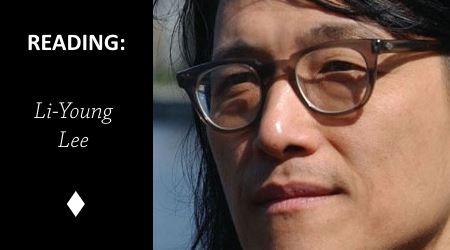Li-Young Lee (b. 1957) is a American poet born to Chinese exiles. His father, who plays an important role in his poetry, was the personal physician to Mao Zedong. His poetry has been compared to John Keats, Rilke and Roethke and he was influenced by old Chinese poems like Tu Fu, which shows in his economic use of language. I read a short but very powerful poem about:
Eating Together
In the steamer is the trout
seasoned with slivers of ginger,
two sprigs of green onion, and sesame oil.
We shall eat it with rice for lunch,
brothers, sister, my mother who will
taste the sweetest meat of the head,
holding it between her fingers
deftly, the way my father did
weeks ago. Then he lay down
to sleep like a snow-covered road
winding through pines older than him,
without any travelers, and lonely for no one.
The precise description of the trout the family will have for lunch so I can almost smell it is a great (and common) poetic device. We see the mother taking the sweetest meat of the head, thereby replacing the role of the father who has been gone for weeks. At this point, the reader realizes his passing and the beautiful ‘Chinese’ last sentence of the poem confirms this.
I picked this poem because I think the image of the snow-covered winding road through an old forest, that is lonely for no one is magical. I like the simplicity of such poetic diction, realizing that it is always at risk of turning into kitsch. But I also know that kitsch requires travelers and interpreters who repeat a phrase until it wears out. In the absence of travelers, in the domain of this poem, it is not only tolerable, but extremely powerful.

One thought on “Reading: Eating Together by Li-Young Lee”
Comments are closed.